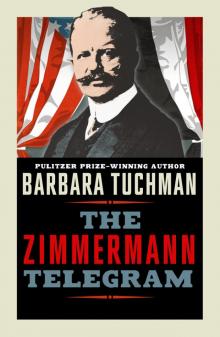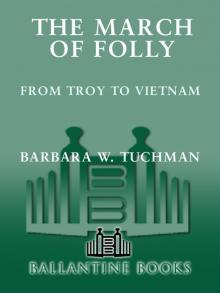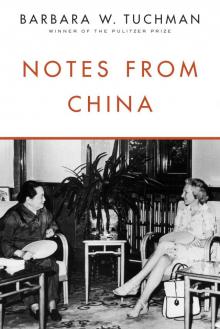- Home
- Barbara W. Tuchman
The Guns of August Page 6
The Guns of August Read online
Page 6
His successor, the melancholy General von Moltke, was something of a pessimist who lacked Schlieffen’s readiness to concentrate all his strength in one maneuver. If Schlieffen’s motto was “Be bold, be bold,” Moltke’s was, “But not too bold.” He worried both about the weakness of his left wing against the French and about the weakness of the forces left to defend East Prussia against the Russians. He even debated with his Staff the advisability of fighting a defensive war against France, but rejected the idea because it precluded all possibility of “engaging the enemy on his own territory.” The Staff agreed that the invasion of Belgium would be “entirely just and necessary” because the war would be one for the “defense and existence of Germany.” Schlieffen’s plan was maintained, and Moltke consoled himself with the thought, as he said in 1913, that “We must put aside all commonplaces as to the responsibility of the aggressor .… Success alone justifies war.” But just to be safe everywhere, each year, cutting into Schlieffen’s dying request, he borrowed strength from the right wing to add to the left.
Moltke planned for a German left wing of 8 corps numbering about 320,000 men to hold the front in Alsace and Lorraine south of Metz. The German center of 11 corps numbering about 400,000 men would invade France through Luxembourg and the Ardennes. The German right wing of 16 corps numbering about 700,000 men would attack through Belgium, smash the famed gateway fortresses of Liège and Namur which held the Meuse, and fling itself across the river to reach the flat country and straight roads on the far side Every day’s schedule of march was fixed in advance. The Belgians were not expected to fight, but if they did the power of the German assault was expected to persuade them quickly to surrender. The schedule called for the roads through Liège to be open by the twelfth day of mobilization, Brussels to be taken by M-19, the French frontier crossed on M-22, a line Thionville-St. Quentin reached by M-31, Paris and decisive victory by M-39.
The plan of campaign was as rigid and complete as the blueprint for a battleship. Heeding Clausewitz’s warning that military plans which leave no room for the unexpected can lead to disaster, the Germans with infinite care had attempted to provide for every contingency. Their staff officers, trained at maneuvers and at war-college desks to supply the correct solution for any given set of circumstances, were expected to cope with the unexpected. Against that elusive, that mocking and perilous quantity, every precaution had been taken except one—flexibility.
While the plan for maximum effort against France hardened, Moltke’s fears of Russia gradually lessened as his General Staff evolved a credo, based on a careful count of Russian railway mileage, that Russia would not be “ready” for war until 1916. This was confirmed in German minds by their spies’ reports of Russian remarks “that something was going to begin in 1916.”
In 1914 two events sharpened Germany’s readiness to a fine point. In April, England had begun naval talks with the Russians, and in June, Germany herself had completed the widening of the Kiel Canal, permitting her new dreadnoughts direct access from the North Sea to the Baltic. On learning of the Anglo-Russian talks, Moltke said in May during a visit to his Austrian opposite number, Franz Conrad von Hötzendorff, that from now on “any adjournment will have the effect of diminishing our chances of success.” Two weeks later, on June 1st, he said to Baron Eckhardstein, “We are ready, and the sooner the better for us.”
3
The Shadow of Sedan
GENERAL DE CASTELNAU, Deputy Chief of the French General Staff, was visited at the War Office one day in 1913 by the Military Governor of Lille, General Lebas, who came to protest the General Staff’s decision to abandon Lille as a fortified city. Situated ten miles from the Belgian border and forty miles inland from the Channel, Lille lay close to the path that an invading army would take if it came by way of Flanders. In answer to General Lebas’ plea for its defense, General de Castelnau spread out a map and measured with a ruler the distance from the German border to Lille by way of Belgium. The normal density of troops required for a vigorous offensive, he reminded his caller, was five or six to a meter. If the Germans extended themselves as far west as Lille, De Castelnau pointed out, they would be stretched out two to a meter.
“We’ll cut them in half!” he declared. The German active Army, he explained, could dispose of twenty-five corps, about a million men, on the Western Front. “Here, figure it out for yourself,” he said, handing Lebas the ruler. “If they come as far as Lille,” he repeated with sardonic satisfaction, “so much the better for us.”
French strategy did not ignore the threat of envelopment by a German right wing. On the contrary, the French General Staff believed that the stronger the Germans made their right wing, the correspondingly weaker they would leave their center and left where the French Army planned to break through. French strategy turned its back to the Belgian frontier and its face to the Rhine. While the Germans were taking the long way around to fall upon the French flank, the French planned a two-pronged offensive that would smash through the German center and left on either side of the German fortified area at Metz and by victory there, sever the German right wing from its base, rendering it harmless. It was a bold plan born of an idea—an idea inherent in the recovery of France from the humiliation of Sedan.
Under the peace terms dictated by Germany at Versailles in 1871, France had suffered amputation, indemnity, and occupation. Even a triumphal march by the German Army down the Champs Elysées was among the terms imposed. It took place along a silent, black-draped avenue empty of onlookers. At Bordeaux, when the French Assembly ratified the peace terms, the deputies of Alsace-Lorraine walked from the hall in tears, leaving behind their protest: “We proclaim forever the right of Alsatians and Lorrainers to remain members of the French nation. We swear for ourselves, our constituents, our children and our children’s children to claim that right for all time, by every means, in the face of the usurper.”
The annexation, though opposed by Bismarck, who said it would be the Achilles’ heel of the new German Empire, was required by the elder Moltke and his Staff. They insisted, and convinced the Emperor, that the border provinces with Metz, Strasbourg, and the crest of the Vosges must be sliced off in order to put France geographically forever on the defensive. They added a crushing indemnity of five billion francs intended to hobble France for a generation, and lodged an army of occupation until it should be paid. With one enormous effort the French raised and paid off the sum within three years, and their recovery began.
The memory of Sedan remained, a stationary dark shadow on the French consciousness. “N’en parlez jamais; pensez-y toujours” (Never speak of it; think of it always) had counseled Gambetta. For more than forty years the thought of “Again” was the single most fundamental factor of French policy. In the early years after 1870, instinct and military weakness dictated a fortress strategy. France walled herself in behind a system of entrenched camps connected by forts. Two fortified lines, Belfort-Epinal and Toul-Verdun, guarded the eastern frontier, and one, Maubeuge-Valenciennes-Lille, guarded the western half of the Belgian frontier; the gaps between were intended to canalize the invasion forces.
Behind her wall, as Victor Hugo urged at his most vibrant: “France will have but one thought: to reconstitute her forces, gather her energy, nourish her sacred anger, raise her young generation to form an army of the whole people, to work without cease, to study the methods and skills of our enemies, to become again a great France, the France of 1792, the France of an idea with a sword. Then one day she will be irresistible. Then she will take back Alsace-Lorraine.”
Through returning prosperity and growing empire, through the perennial civil quarrels—royalism, Boulangism, clericalism, strikes, and the culminating, devastating Dreyfus Affair—the sacred anger still glowed, especially in the army. The one thing that held together all elements of the army, whether old guard or republican, Jesuit or Freemason, was the mystique d’Alsace. The eyes of all were fixed on the blue line of the Vosges. A captain of infantry confessed in
1912 that he used to lead the men of his company in secret patrols of two or three through the dark pines to the mountaintops where they could gaze down on Colmar. “On our return from those clandestine expeditions our columns reformed, choked and dumb with emotion.”
Originally neither German nor French, Alsace had been snatched back and forth between the two until, under Louis XIV, it was confirmed to France by the Treaty of Westphalia in 1648. After Germany annexed Alsace and part of Lorraine in 1870 Bismarck advised giving the inhabitants as much autonomy as possible and encouraging their particularism, for, he said, the more Alsatian they felt, the less they would feel French. His successors did not see the necessity. They took no account of the wishes of their new subjects, made no effort to win them over, administered the provinces as Reichsland, or “Imperial territory,” under German officials on virtually the same terms as their African colonies, and succeeded only in infuriating and alienating the population until in 1911 a constitution was granted them. By then it was too late. German rule exploded in the Zabern Affair in 1913 which began, after an exchange of insults between townspeople and garrison, when a German officer struck a crippled shoemaker with his saber. It ended in the complete and public exposure of German policy in the Reichsland, in a surge of anti-German feeling in world opinion, and in the simultaneous triumph of militarism in Berlin where the officer of Zabern became a hero, congratulated by the Crown Prince.
For Germany 1870 was not a final settlement. The German day in Europe which they thought had dawned when the German Empire was proclaimed in the Hall of Mirrors at Versailles was still postponed. France was not crushed; the French Empire was actually expanding in North Africa and Indo-China; the world of art and beauty and style still worshiped at the feet of Paris. Germans were still gnawed by envy of the country they had conquered. “As well off as God in France,” was a German saying. At the same time they considered France decadent in culture and enfeebled by democracy. “It is impossible for a country that has had forty-two war ministers in forty-three years to fight effectively,” announced Professor Hans Delbrück, Germany’s leading historian. Believing themselves superior in soul, in strength, in energy, industry, and national virtue, Germans felt they deserved the dominion of Europe. The work of Sedan must be completed.
Living in the shadow of that unfinished business, France, reviving in spirit and strength, grew weary of being eternally on guard, eternally exhorted by her leaders to defend herself. As the century turned, her spirit rebelled against thirty years of the defensive with its implied avowal of inferiority. France knew herself to be physically weaker than Germany. Her population was less, her birth rate lower. She needed some weapon that Germany lacked to give herself confidence in her survival. The “idea with a sword” fulfilled the need. Expressed by Bergson it was called élan vital, the all-conquering will. Belief in its power convinced France that the human spirit need not, after all, bow to the predestined forces of evolution which Schopenhauer and Hegel had declared to be irresistible. The spirit of France would be the equalizing factor. Her will to win, her élan, would enable France to defeat her enemy. Her genius was in her spirit, the spirit of la gloire, of 1792, of the incomparable “Marseillaise,” the spirit of General Margueritte’s heroic cavalry charge before Sedan when even Wilhelm I, watching the battle, could not forbear to cry, “Oh, les braves gens!”
Belief in the fervor of France, in the furor Gallicae, revived France’s faith in herself in the generation after 1870. It was that fervor, unfurling her banners, sounding her bugles, arming her soldiers, that would lead France to victory if the day of “Again” should come.
Translated into military terms Bergson’s élan vital became the doctrine of the offensive. In proportion as a defensive gave way to an offensive strategy, the attention paid to the Belgian frontier gradually gave way in favor of a progressive shift of gravity eastward toward the point where a French offensive could be launched to break through to the Rhine. For the Germans the roundabout road through Flanders led to Paris; for the French it led nowhere. They could only get to Berlin by the shortest way. The more the thinking of the French General Staff approached the offensive, the greater the forces it concentrated at the attacking point and the fewer it left to defend the Belgian frontier.
The doctrine of the offensive had its fount in the Ecole Supérieure de la Guerre, or War College, the ark of the army’s intellectual elite, whose director, General Ferdinand Foch, was the molder of French military theory of his time. Foch’s mind, like a heart, contained two valves: one pumped spirit into strategy; the other circulated common sense. On the one hand Foch preached a mystique of will expressed in his famous aphorisms, “The will to conquer is the first condition of victory,” or more succinctly, “Victoire c’est la volonté,” and, “A battle won is a battle in which one will not confess oneself beaten.”
In practice this was to become the famous order at the Marne to attack when the situation called for retreat. His officers of those days remember him bellowing, “Attack! Attack!” with furious, sweeping gestures while he dashed about in short rushes as if charged by an electric battery. Why, he was later asked, did he advance at the Marne when he was technically beaten? “Why? I don’t know. Because of my men, because I had a will. And then—God was there.”
Though a profound student of Clausewitz, Foch did not, like Clausewitz’s German successors, believe in a foolproof schedule of battle worked out in advance. Rather he taught the necessity of perpetual adaptability and improvisation to fit circumstances. “Regulations,” he would say, “are all very well for drill but in the hour of danger they are no more use … You have to learn to think.” To think meant to give room for freedom of initiative, for the imponderable to win over the material, for will to demonstrate its power over circumstance.
But the idea that morale alone could conquer, Foch warned, was an “infantile notion.” From his flights of metaphysics he would descend at once, in his lectures and his prewar books Les Principes de la Guerre and La Conduite de la Guerre, to the earth of tactics, the placing of advance guards, the necessity of sureté, or protection, the elements of firepower, the need for obedience and discipline. The realistic half of his teaching was summed up in another aphorism he made familiar during the war, “De quoi s’agit-il?” (What is the essence of the problem?)
Eloquent as he was on tactics, it was Foch’s mystique of will that captured the minds of his followers. Once in 1908 when Clemenceau was considering Foch, then a professor, for the post of Director of the War College, a private agent whom he sent to listen to the lectures reported back in bewilderment, “This officer teaches metaphysics so abstruse as to make idiots of his pupils.” Although Clemenceau appointed Foch in spite of it, there was, in one sense, truth in the report. Foch’s principles, not because they were too abstruse but because they were too attractive, laid a trap for France. They were taken up with particular enthusiasm by Colonel Grandmaison, “an ardent and brilliant officer” who was Director of the Troisième Bureau, or Bureau of Military Operations, and who in 1911 delivered two lectures at the War College which had a crystallizing effect.
Colonel Grandmaison grasped only the head and not the feet of Foch’s principles. Expounding their élan without their sureté, he expressed a military philosophy that electrified his audience. He waved before their dazzled eyes an “idea with a sword” which showed them how France could win. Its essence was the offensive à outrance, offensive to the limit. Only this could achieve Clausewitz’s decisive battle which “exploited to the finish is the essential act of war” and which “once engaged, must be pushed to the end, with no second thoughts, up to the extremes of human endurance.” Seizure of initiative is the sine qua non. Preconceived arrangements based on a dogmatic judgment of what the enemy will do are premature. Liberty of action is achieved only by imposing one’s will upon the enemy. “All command decisions must be inspired by the will to seize and retain the initiative.” The defensive is forgotten, abandoned, discarded; its only p
ossible justification is an occasional “economizing of forces at certain points with a view to adding them to the attack.”
The effect on the General Staff was profound, and during the next two years was embodied in new Field Regulations for the conduct of war and in a new plan of campaign called Plan 17, which was adopted in May, 1913. Within a few months of Grandmaison’s lectures, the President of the Republic, M. Fallières, announced: “The offensive alone is suited to the temperament of French soldiers .… We are determined to march straight against the enemy without hesitation.”
The new Field Regulations, enacted by the government in October, 1913, as the fundamental document for the training and conduct of the French Army, opened with a flourish of trumpets: “The French Army, returning to its traditions, henceforth admits no law but the offensive.” Eight commandments followed, ringing with the clash of “decisive battle,” “offensive without hesitation,” “fierceness and tenacity,” “breaking the will of the adversary,” “ruthless and tireless pursuit.” With all the ardor of orthodoxy stamping out heresy, the Regulations stamped upon and discarded the defensive. “The offensive alone,” it proclaimed, “leads to positive results.” Its Seventh Commandment, italicized by the authors, stated: “Battles are beyond everything else struggles of morale. Defeat is inevitable as soon as the hope of conquering ceases to exist. Success comes not to him who has suffered the least but to him whose will is firmest and morale strongest.”
Nowhere in the eight commandments was there mention of matériel or firepower or what Foch called sureté. The teaching of the Regulations became epitomized in the favorite word of the French officer corps, le cran, nerve, or, less politely, guts. Like the youth who set out for the mountaintop under the banner marked “Excelsior!” the French Army marched to war in 1914 under a banner marked “Cran.”

 Practicing History: Selected Essays
Practicing History: Selected Essays Stilwell and the American Experience in China, 1911-45
Stilwell and the American Experience in China, 1911-45 Bible and Sword: England and Palestine From the Bronze Age to Balfour
Bible and Sword: England and Palestine From the Bronze Age to Balfour The Guns of August
The Guns of August The Proud Tower: A Portrait of the World Before the War, 1890-1914
The Proud Tower: A Portrait of the World Before the War, 1890-1914 The Zimmermann Telegram
The Zimmermann Telegram A Distant Mirror: The Calamitous 14th Century
A Distant Mirror: The Calamitous 14th Century The March of Folly: From Troy to Vietnam
The March of Folly: From Troy to Vietnam The First Salute
The First Salute Notes From China
Notes From China Practicing History
Practicing History Stilwell and the American Experience in China
Stilwell and the American Experience in China First Salute
First Salute Bible and Sword
Bible and Sword